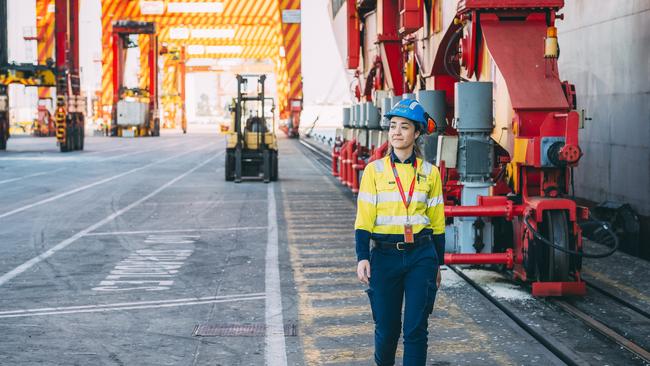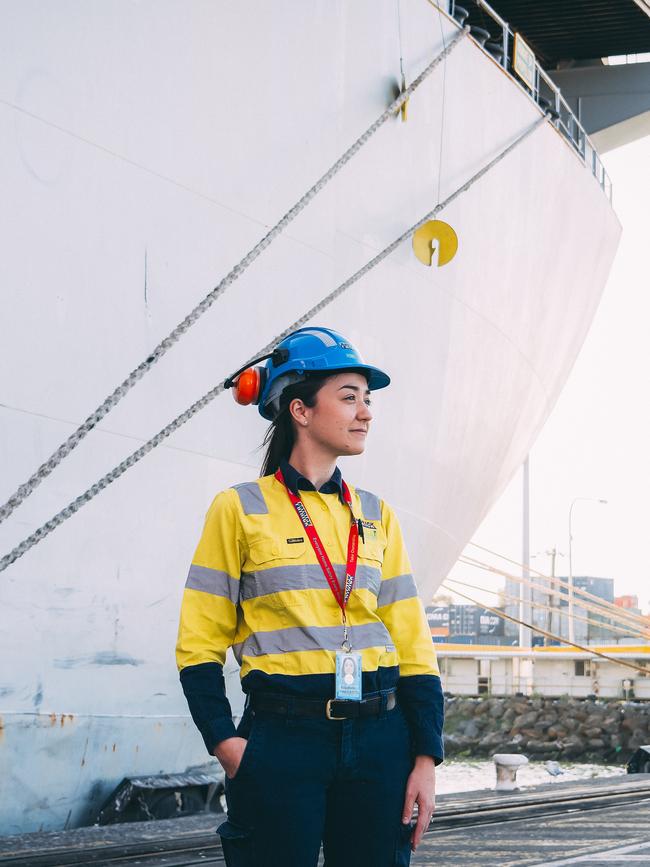Focus on supply of the right skillset
Social change can be a powerful force, particularly when you are sitting on the wrong side of it.

Social change can be a powerful force, particularly when you are sitting on the wrong side of it.
That was the uncomfortable feeling that was troubling Matt Hollamby, the manager of Patrick Terminals’ Brisbane terminal, in 2014.
It was clear to Hollamby that his employer – and his industry – had a problem with diversity.
“Stevedoring was seen as a male-dominated industry, a heavy, physical blue-collar industry,” Hollamby says.
“Patrick had a long history as a male-dominated organisation, we did not get many female applicants for jobs, and those that we got were hampered by not having industry experience. Plus, most people do not really understand how automated and hi-tech this industry is. It was something we had to change.”
However, this recognition was not driven by a grand commitment to a social cause: it simply made sense to a company that was hindered by misconceived tradition.
“As a company, we had effectively ruled out half the workforce from working with us, because of our insistence, quite correctly, that you had to have some background, some skills to work in this business.
“The motivation to change how we recruited wasn’t some sort of social justice commitment, although clearly that is important, but the motivation to broaden our potential recruitment pool to 100 per cent of the population, as it should be in any normal business,” Hollamby says.
Patrick ran an innovation competition in 2014, around its national workforce. Hollamby proposed a cadetship for talented women who lacked industry experience: it did not win the competition, but the company wanted to implement it anyway.
“We settled on a two-year structured cadetship, the Women In Logistics (WILpower) Management Cadetship, that aims to deliver on-the-job learning in operational roles,” he says.
“We ran the first iteration of the cadetship in 2015, and it was subsequently run in 2019, and we are looking at running it again early next year. We’ve had a total of 28 people through the program, but it isn’t for everyone, and we’ve had some people leave.
“But the bottom line for us is that before the cadetship, there were three women in operational roles in the whole Patrick business, and 2 per cent of the operational managers in Patrick were female. Today, we’ve lifted that percentage to 23.5 per cent, and here at the Brisbane terminal, where we’ve championed the program pretty hard, 38 per cent of our operational managers are women.”
The program includes a full-time, competitive salary, dedicated “onboarding” to build skills and internal networks, job rotations across a broad spectrum of roles, a tailored tertiary qualification – a graduate diploma of maritime logistics, in partnership with the University of Tasmania’s Australian Maritime College in Launceston – as well as individualised mentoring and ongoing support.
“None of this is cheap, we invest heavily in these women. But the finished product – we couldn’t be happier,” Hollamby says.
“We expose them to the key roles, being ship manager, yard manager, and production manager. We have women working in all of those frontline roles. The whole point is to develop women in stevedoring management roles, not in traditional head-office accounting or HR-type roles, but frontline roles.”
Patrick’s WILpower cadets have come from a variety of sectors. “We’ve taken women from the military, from heavy industry, transport, engineering. The attributes we need are leadership skills, logistical thinking, and the ability to make decisions potentially in moments of crisis, because there’s a lot of moving parts in the terminals. We certainly think we’ve gained some first-class operational managers,” he says.
Again, diversity for its own sake is not the aim, but is a benefit. “This is not an affirmative action program. Because our industry insisted on experience, we ended up with an ever-reducing pool of people who had the necessary skills, because we could not get new blood in,” Hollamby says.
“For us it was all about equipping women with the requisite skills, so that when these jobs appear, we have a pool of women who can apply for them and get them on merit. It is building a diverse succession pool for our operational roles across the business.”
Emily Link, director of people, culture and safety at Qube Group (which, as part of the Qube/Brookfield consortium, owns 50 per cent of Patrick Terminals) is also looking to diversify the logistics company’s workforce.
Earlier this year, Qube launched a cadetship program aiming to attract people – particularly women – at the beginning of their career journeys into the supply chain sector.
Like Patrick, Qube sees broadening its sources of intake as the primary aim. “We often have quite a lot of roles to fill, but we sometimes find them hard to fill, because we don’t get a lot of applications. We believe that’s because younger people – particularly women – don’t for some reason see the supply chain industry as a career option,” Link says.
“There seems to be a misconception that it is very hard, heavy work, and male-dominated. If that … stays entrenched, it will stay male-dominated. We recognise that it’s up to us to change that.”
To that end, Qube redesigned its job specifications, and parameters.
“Not all roles need years of industry experience. We looked at our shift pattern, too. Once we reshaped that and assigned mentors, the cadet program was born,” she says.
“We started earlier this year, with a view to trial four or five people, but within the first three or four weeks, I had managers around the country calling saying, ‘I’ve got a spot for a cadet; I’ve got this great entry-level job; I’ve got a great mentor’. So, every day, it’s grown bigger – we currently have 15 people and we’re recruiting more.
“We find that even just exposing people to what a hi-tech industry it is, compared to what they may have thought, has an immediate impact. Once a new group of people – particularly women – experience the role, they’ve really reacted to it positively.”
Program gives women chance for careers in stevedoring

In hindsight, Liz Pinkerton was precisely the sort of person that Patrick Terminals’ WILpower management cadetship was looking for.
A chemical engineer by profession, Pinkerton had five years of experience working in mining and at an aluminium smelter, and was no stranger to a high-safety male-dominated, unionised heavy industry.
But she had not worked in frontline management until she started WILpower.
“I had done project work, I had done technical work as an engineer, but my resume had a gap for frontline management,” Pinkerton says.
“I saw the WILpower ad and I thought it was exactly what I was looking for, to close that skillset gap.”
She applied for the first WILpower intake, in 2015, and was accepted. Six years on, she is still with Patrick, working as national health, safety and environmental (HSE) manager, systems and projects. Pinkerton, 34, found the transition to stevedoring easy in one way, but surprising in another.
“Until you’ve seen it, you take stevedoring for granted – most people would have no idea how we get goods in and out of the country, let alone how hi-tech it is,” she says.
“The state-of-the-art technology and automation that’s in the Patrick business was surprising. Being from an engineering background, the automation – the AutoStrad terminals – piqued my interest, and being a process engineer, stevedoring is essentially a process which we move boxes on and off trucks and on and off vessels, using various pieces of equipment.
“I realised that I had directly transferable skills and experiences. Also, coming from heavy industry, I found the operational culture very similar.”
Having had two children while at Patrick, and moving from Brisbane to Melbourne with her partner’s military posting, Pinkerton says the Patrick business has been “extremely supportive” of her.
“I’m not sure if that’s an industry-wide thing, but Patrick couldn’t have been more supportive of me in providing maternity leave, support in the return-to-work process, and work-life balance.”
Most important to Pinkerton is knowing that she is not in her job because she is a woman – she is there because of her skillset.
“I’m a process engineer that has been trained and mentored to be in the role I’m in.
“This program is not about meeting quotas, it’s about giving people like me the chance to experience this industry, and build a career in it,” she says.


